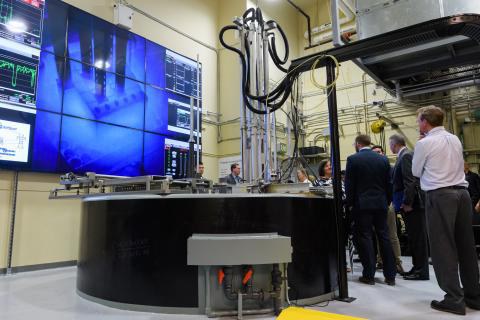Purdue to Expand Online Presence with Graduate Level Nuclear Engineering

A partnership between Purdue University’s School of Nuclear Engineering and Purdue Online -- College of Engineering, will bring nuclear graduate coursework and graduate programs. Included in the programs is the newly available concentration in Nuclear Engineering under the Interdisciplinary Engineering (IDE) Master’s program. The Master of Nuclear Engineering (MNE) degree is the second nuclear online graduate program and is expected to launch in 2020.
Students have the option of now enrolling in the concentration in Nuclear Engineering under the Interdisciplinary (IDE) Engineering Master’s program to begin study in the nuclear engineering area. The Master of Nuclear Engineering degree program is expected to launch in 2020 and will require a total of six nuclear engineering courses and another four from science and engineering graduate-level courses.
The Bureau of Labor Statistics projects management and consulting nuclear engineering jobs will grow 4% by the year 2026, while electric power generation jobs will decline by the same year. National employers are now seeking master’s-level nuclear engineering professionals to fill roles including engineering manager and information technology consultants with skills including scheduling and staff management.
“Energy is one of the key global challenges of our time, and nuclear energy has been one of the most sustainable energy options over the last six decades. In view of its ability to provide reliable, safe, and affordable electricity in a broad spectrum of energy scale with no carbon gas emissions, nuclear energy is indisputably the most feasible and indispensable option among many energy sources of the future,” says Seungjin Kim, head of the School of Nuclear Engineering.
Purdue Online's Nuclear Engineering master’s program is designed for professional engineers seeking to advance their skills without disrupting their careers. Courses are offered in the following concentrations:
- Nuclear Engineering-Reactor Physics
- Nuclear Materials
- Fusion
- Thermal hydraulics and safety
- Radiation and Security
Professor Shripad Revankar, professor and graduate program chair, is leading development of the new online program, focusing on the rigor and quality for which Purdue Nuclear Engineering program is renowned. Purdue’s School of Nuclear Engineering, established in 1960, is consistently top-ranked by U.S. World & News Report. It offers excellence in both research and educational programs, while expanding the frontier of knowledge through its comprehensive areas of nuclear engineering, engineering and technology.
“Nuclear Engineering at Purdue has a long and proud history. The fully digitized reactor and the new online learning offerings will further broaden its impact on industry and society,” says Mung Chiang, the John A. Edwardson Dean of the College of Engineering.
The curriculum will include an introduction to the fundamentals of reactor physics and operation through the school’s state-of-the-art equipment, including Purdue’s Reactor Number One (PUR-1). The reactor has a maximum of 10 kilowatts and runs in a 17-foot deep pool of water. Purdue’s reactor is the first in the nation to have an all-digital instrumentation and control system to enable innovative research and next-generation teaching capabilities.
After completing the online Nuclear Engineering master’s program, graduates may expect better career prospects, greater in-depth working knowledge in the nuclear area and potential for increased pay. Graduates could pursue work opportunities in a variety of fields, including research in universities or national laboratories, with consulting firms, electric utilities, national security, and in government agencies or the defense sector.
Revankar believes that providing a flexible, educational opportunity to an online global community is of great value, reaching those who otherwise could not obtain a specialized nuclear energy advanced degree. School Head Kim says the online program aligns closely with the school’s educational and research mission.
“We live in a time where advanced nuclear reactors are actively being constructed worldwide, and interest in small modular reactors and next-generation nuclear reactors is at its highest. As such, it’s a pivotal time for us to provide global society with top-notch ethical nuclear engineers as future leaders,” Kim says.
For more information on the programs visit PurdueEngineeringOnline.com or email us at engronline@purdue.edu
Writer - Linda Carrick Thomas, Featured Word Inc
